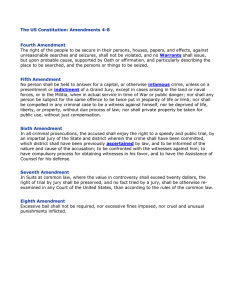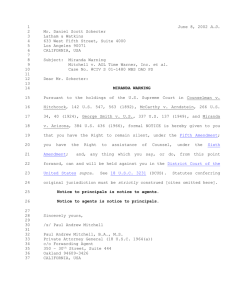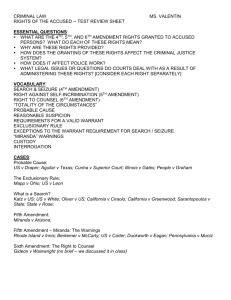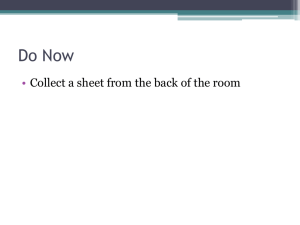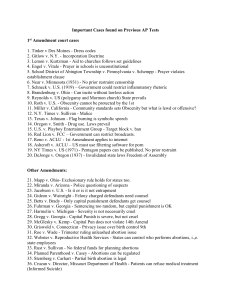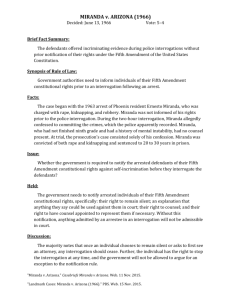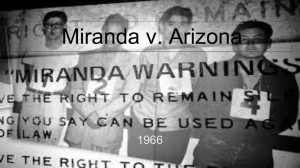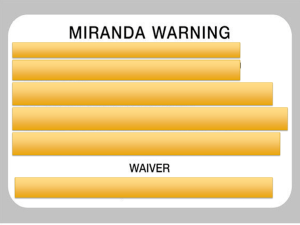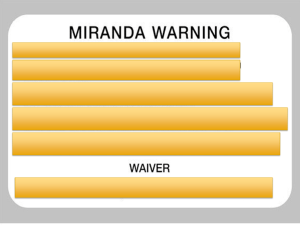Miranda v. Arizona, 384 US 436 (1966)
advertisement
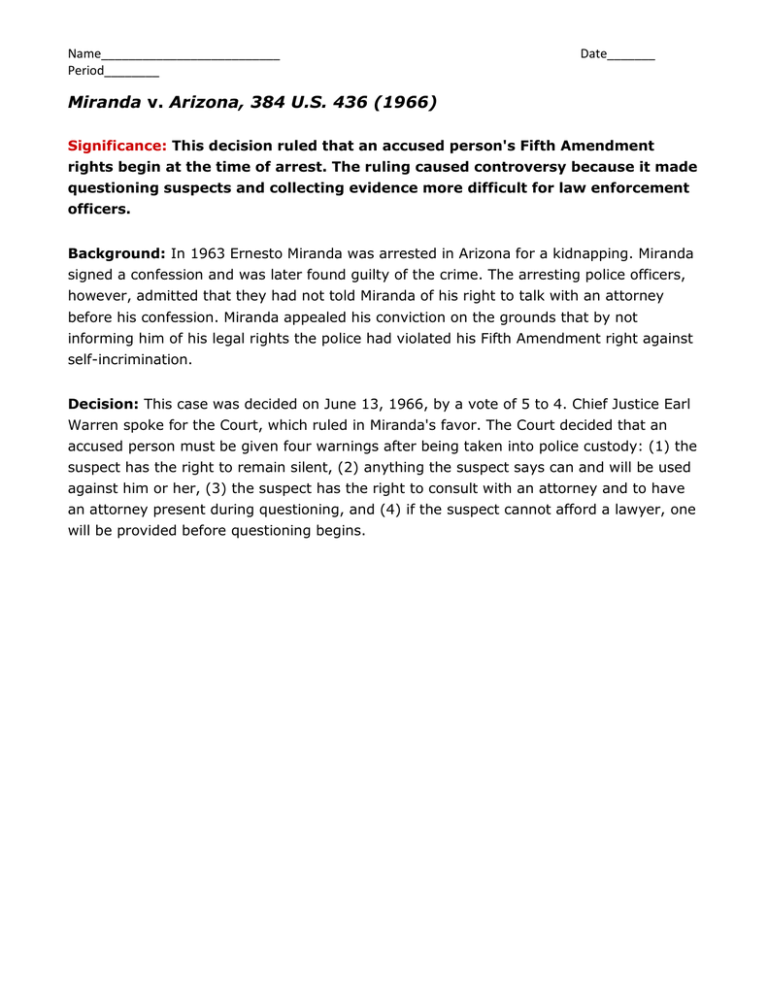
Name__________________________ Period________ Date_______ Miranda v. Arizona, 384 U.S. 436 (1966) Significance: This decision ruled that an accused person's Fifth Amendment rights begin at the time of arrest. The ruling caused controversy because it made questioning suspects and collecting evidence more difficult for law enforcement officers. Background: In 1963 Ernesto Miranda was arrested in Arizona for a kidnapping. Miranda signed a confession and was later found guilty of the crime. The arresting police officers, however, admitted that they had not told Miranda of his right to talk with an attorney before his confession. Miranda appealed his conviction on the grounds that by not informing him of his legal rights the police had violated his Fifth Amendment right against self-incrimination. Decision: This case was decided on June 13, 1966, by a vote of 5 to 4. Chief Justice Earl Warren spoke for the Court, which ruled in Miranda's favor. The Court decided that an accused person must be given four warnings after being taken into police custody: (1) the suspect has the right to remain silent, (2) anything the suspect says can and will be used against him or her, (3) the suspect has the right to consult with an attorney and to have an attorney present during questioning, and (4) if the suspect cannot afford a lawyer, one will be provided before questioning begins. Name__________________________ Period________ Date_______ The US Constitution: Amendments 4-8 Fourth Amendment The right of the people to be secure in their persons, houses, papers, and effects, against unreasonable searches and seizures, shall not be violated, and no Warrants shall issue, but upon probable cause, supported by Oath or affirmation, and particularly describing the place to be searched, and the persons or things to be seized. Fifth Amendment No person shall be held to answer for a capital, or otherwise infamous crime, unless on a presentment or indictment of a Grand Jury, except in cases arising in the land or naval forces, or in the Militia, when in actual service in time of War or public danger; nor shall any person be subject for the same offence to be twice put in jeopardy of life or limb; nor shall be compelled in any criminal case to be a witness against himself, nor be deprived of life, liberty, or property, without due process of law; nor shall private property be taken for public use, without just compensation. Sixth Amendment In all criminal prosecutions, the accused shall enjoy the right to a speedy and public trial, by an impartial jury of the State and district wherein the crime shall have been committed, which district shall have been previously ascertained by law, and to be informed of the nature and cause of the accusation; to be confronted with the witnesses against him; to have compulsory process for obtaining witnesses in his favor, and to have the Assistance of Counsel for his defense. Seventh Amendment In Suits at common law, where the value in controversy shall exceed twenty dollars, the right of trial by jury shall be preserved, and no fact tried by a jury, shall be otherwise reexamined in any Court of the United States, than according to the rules of the common law. Eighth Amendment Excessive bail shall not be required, nor excessive fines imposed, nor cruel and unusual punishments inflicted. Name__________________________ Period________ Date_______ Background Knowledge 1- Why are the 4th-8th amendments referred to as the rights of the accused? ( 2- Based on their previous experiences under the oppressive rule of England, why did the framers of the Constitution emphasize the rights of the accused in the Bill of Rights? Analyzing the Sources 3- Use your device to define the term precedent. Summarize the impact of Miranda v. Arizona will set a judicial precedent. (RH- 2 Central Idea or Summary) 4- In what amendment is due process found? Use your device to define the term due process. How is due process supported by the Miranda v. Arizona decision? (RH-1 Textual Evidence, RH- 4 meaning of words) 5- Using the decision section of the Miranda v. Arizona source, what guidelines do law enforcement officials have to follow when collecting evidence or questioning a suspect? (RH-1 Textual Evidence) 6- Do you think the Supreme Court should have ruled in Miranda’s favor? Support your answer with textual evidence. (RH-1 Textual Evidence) Name__________________________ Period________ Date_______ 7- Select the Amendment(s) that you feel is the most convincing/persuasive piece of evidence to support the stand you took in #6. Provide specific textual evidence to support your conclusion. (RH-1 Textual Evidence) Extension: Scenario: Suspect is arrested for drug trafficking. When suspect is taken into custody by the police for questioning, he signs a confession admitting to the crime. Through the judicial process, it was later discovered by his attorney that the defendant was never read his Miranda rights, and therefore the confession could not admitted as evidence in the trial. As a result, the suspect was acquitted of all charges. (RH-9 Relationship between primary vs. secondary sources) Explain how the Supreme Court decision in Miranda vs. Arizona would apply to the above following scenario.
